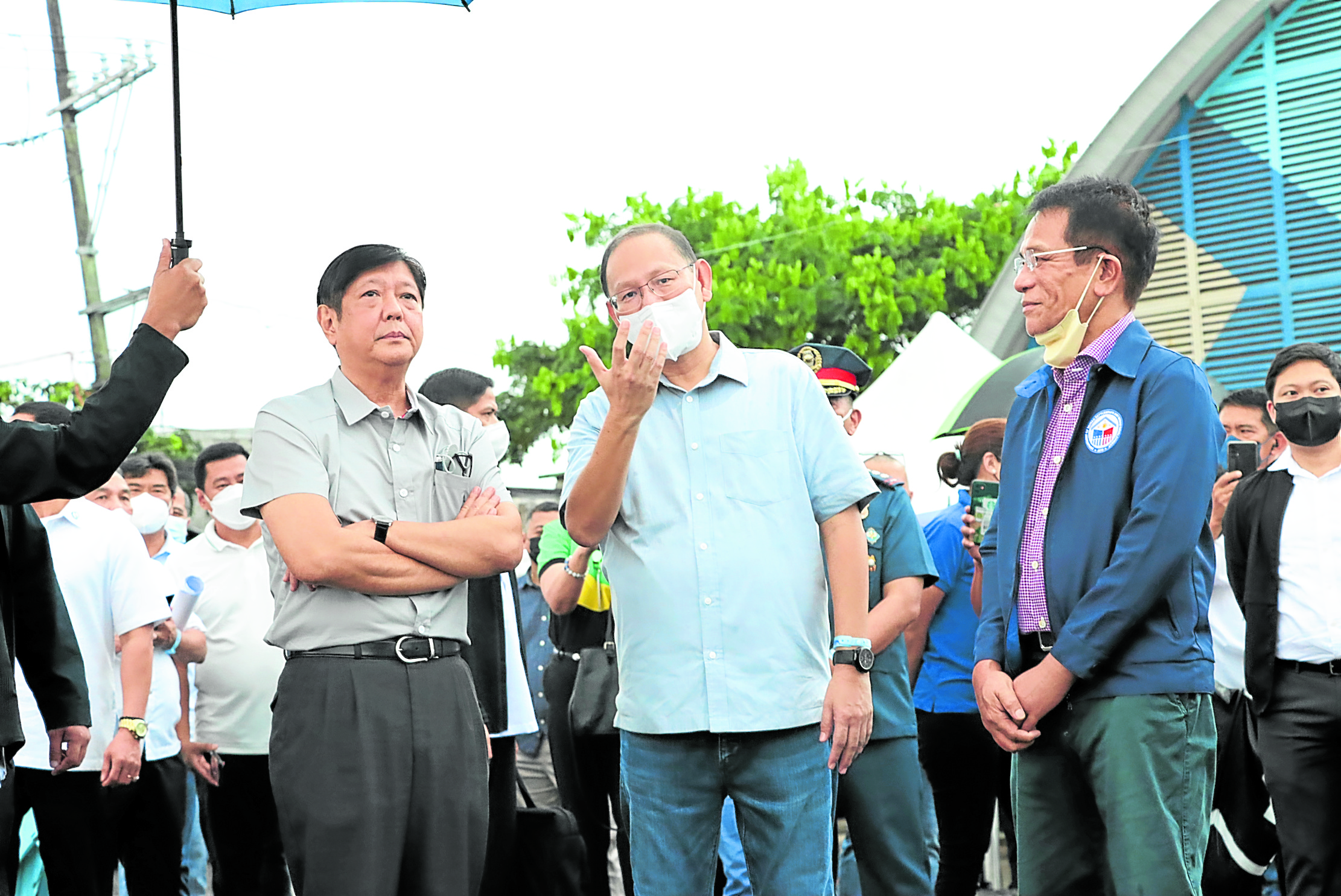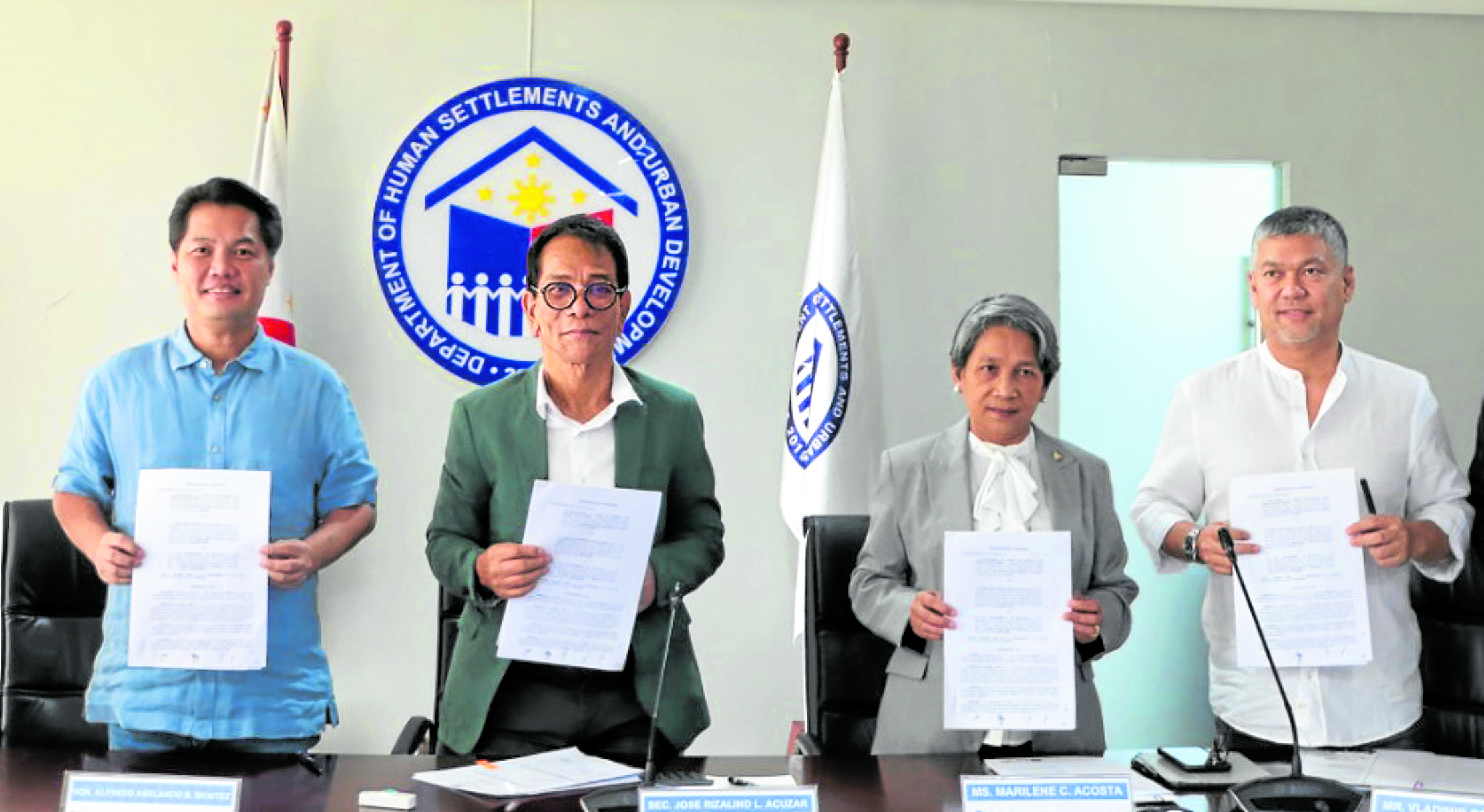Private builders key to success of PBBM’s ‘Pambansang Pabahay’

President Ferdinand Marcos Jr. is briefed by Marikina City Mayor Marcelino Teodoro regarding the Bagong Sibol Housing Project, one of the first projects under the Pambansang Pabahay para sa Pilipino Program.
To build six million housing units under the term of President Ferdinand R. Marcos Jr., the Department of Human Settlements and Urban Development (DHSUD), through the flagship Pambansang Pabahay para sa Pilipino Housing (4PH) Program, unlocks more partnership modalities for all stakeholders, particularly private contractors and developers.
Engaging stakeholders
DHSUD Secretary Jose Rizalino Acuzar acknowledges that the government alone cannot address the housing backlog now pegged at more than 6.5 million units—hence, the promotion of joint venture agreements (JVA) and public-private partnerships (PPP). Acuzar has thus actively engaged stakeholders particularly members of the country’s top real estate developers, contractors and builders, including the National Real Estate Association, Inc. (NREA) and Chamber of Real Estate and Builders’ Associations Inc. (Creba).
Acuzar pointed out that property players will play a vital role in addressing the backlog through their resources, expertise and international linkages.
“NREA, Creba and other private organizations we have engaged are absolute multipliers and prime movers in producing affordable and decent homes that most Filipinos dream about. Our doors are wide open for partnership to all stakeholders. The government cannot do it alone, we need to be innovative,” Acuzar added.
Acuzar also met with the Subdivision and Housing Developers Association Inc. (SHDA) and Organization of Socialized and Economic Housing Developers of the Philippines (OSHDP) to discuss 4PH with them.
Private sector participation
The DHSUD recently released the 4PH program’s Operations Manual which cites JVA and PPP as among the strategic solutions touted to accelerate the execution of the flagship housing program. Through these schemes, private developers and contractors can actively participate in the program.
As the lead agency and key enabler of the 4PH Program, the DHSUD authorizes three major proponents which include local government units (LGUs) availing of developmental loan from government financial institutions (GFIs), JVA or PPP between LGUs and developer/contractors, and private developers through turnkey projects.
“This is where we need the participation of private contractors and developers. They (private developers) can partner with LGUs through JVA or PPP, subject to existing laws, rules and regulations,” Acuzar said.

President Ferdinand Marcos Jr. is briefed by Marikina City Mayor Marcelino Teodoro regarding the Bagong Sibol Housing Project, one of the first projects under the Pambansang Pabahay para sa Pilipino Program.
To commence the housing construction, LGUs, as project lead, shall be responsible for applying for a development loan from GFIs. They may also enter into JVAs or form JV corporations with private sector partners.
“With the 4PH Program’s financial structure, LGUs and small to medium developers and contractors will now have access to public and private funds in the form for developmental loans,” the housing chief explained.
Guided by the provisions under the balanced housing development program, DHSUD allows full participation of real estate developers from conceptualization, design, development and construction. Based on the Operations Manual, the standards or area specifications and ceiling price should be aligned with the housing units under the program.
Under turnkey project scheme, partner-developers may offer their completed or allocated housing units to targeted LGUs and their buyer-beneficiaries, according to the released manual.
Funds available
Contractors and companies with JVA plans on land development and housing construction with LGUs may now start discussing with the Home Development Mutual Fund or Pag-IBIG Fund to secure a developmental loan under the 4PH Program. For this, Pag-IBIG Fund has allocated P250 billion for developers and buyer-beneficiaries.
“The P250 billion financial agreement, which the Department of Human Settlements and Urban Development and Pag-IBIG signed in November 2022, opens multiple avenues for all housing construction entities to participate in this housing program,” Acuzar said. “This will trigger the initial phase of housing construction under 4PH.”
Acuzar has likewise urged small and medium-sized companies involved in housing construction to consider entry into the 4PH Program through developmental loans.
“With our innovative financial structure and the increasing interest from financial institutions, access to funds has been improved for these low to medium capital developers and contractors,” he concluded.
